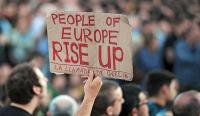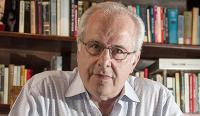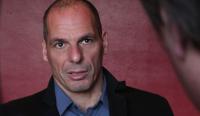The activist goup „Extinction Rebellion“ is striving for an exit of fossil fuels by 2025, occupying bridges and government facilities. „Direct actions“ of this type are needed to ring the alarm bells. George Monbiot was involved in „direct actions“ himself previously, for example when he tried to arrest today’s National Security Advisor John Bolton in 2008 for his involvement in the illegal Iraq War. However, in addition to actions, a new progressive narrative is needed as well, in order to replace the neoliberal narrative. Although neoliberalism is morally, economicaly and politicaly bancrupt since the financial crisis in 2008, the left has not been able to challenge it with a new narrative.
George Monbiot, columnist with the Guardian und author of Heat: How to Stop the Planet Burning and Out of the Wreckage. A New Politics for an Age of Crisis
Fabian Scheidler: There is a group in the UK called Extinction Rebellion, calling for an end to fossil fuels by 2025, blocking bridges and government facilities. They are also part of the international Friday for Future school strike alliance with tens of thousands of students striking all over the world for rapid climate action. Can you talk about these movements and their significance?
George Monbiot: Yes. I’ve been involved with Extinction Rebellion. I’ve been on a couple of their actions. Very successful actions in central London, shutting down bridges, occupying Parliament Square. I think they’re great and I think this is exactly what we need. We need something radical, visible, far more effective than we’ve seen so far. And there’s some very impressive people involved. What I love seeing is this mixture of older and younger people. When I was involved in direct actions twenty, thirty years ago we were kind of doing it for the first time. It was generally all young people, and we didn’t realize that people in previous generations had done all this and had learned from their mistakes and had developed good techniques and bad techniques of doing so. In a way our arrogance was kind of a good thing, because we had the confidence just to say, “We’re gonna save the world, we’re gonna push through all this, we don’t need to learn anything, we’re just gonna do it.” And there was something quite good about it in a way, but we would’ve benefited greatly from other people’s wisdom. Now, what I love about Extinction Rebellion is it’s got some veteran activists involved, but it’s also got students and school children, large numbers of very fine young people who’ve got the confidence, who’ve got the excitement about it. And the combination I think is very powerful.
Fabian Scheidler: You’re talking about direct action. You once tried to arrest John Bolton, who is now a major figure in the White House, of course. What was the reason for this? Can you describe the situation or what you were trying to do and why?
George Monbiot: Yes, so the reason I tried to arrest him was for his role in the Iraq War, where as US ambassador to the United Nations he basically pushed for UN resolutions to be completely ignored and for this totally unjustifiable war in which very large numbers of people died to go ahead. And as we know, it was an illegal war, and it seems to me that the only people who get prosecuted for crimes against humanity are the small players, the small fry. People in governments in the US, in the UK never get prosecuted. They never get arrested and so I wanted to help fill that gap by trying to arrest John Bolton. He was doing a talk at a literary festival, believe it or not. What John Bolton has to do with literature – No idea. But anyways, there he was and there I was, and I had planned this arrest and tried to storm the stage to arrest him and it was the closest I’ve gotten to the sensation of flying that I’ve ever come. Where suddenly I found myself in the air, flapping my arms, and there is this bloke, the biggest man I’ve ever seen in my life, who just appeared from behind a curtain and picked me up under one arm and carried me off. I was flapping in the air, saying, “Oh, I’m gonna arrest John Bolton.” And I was just sort of disappeared round the back of the stage and dumped unceremoniously outside, so it wasn’t very successful, but the thought was there.
Fabian Scheidler: I mean, John Bolton now, as many analysts say, is planning several wars which he’d like to see: against Iran, and now even against Venezuela. What are your thoughts on his foreign policy?
George Monbiot: It’s like Trump has surrounded himself by the craziest people you can find in the whole United States. It’s a remarkable thing, isn’t it, the US? That you’ve got so many brilliant people, doing so many brilliant things, and again and again it elects complete idiots as presidents – terrifying, horrifying people: Trump, George W. Bush – these total nut cases, who are selfish, blinkered, idiotic, and very, very dangerous. And they surround themselves by people in their own image: selfish, blinkered, idiotic, and very, very dangerous. And John Bolton certainly falls within that category. So what can you do? I mean, it’s a deeply frightening situation and my hope is that we see far more Democrats like Alexandria Ocasio-Cortez, like Ayanna Pressley coming through, who are going to inject some sense into US politics and hopefully before long becoming the dominant force. Because you can’t carry on like this, you can’t carry on electing psychopaths over a society of altruists. Fabian Scheidler: In your latest book, Out of the Wreckage, you talk about the power of stories and the need for a new progressive narrative. Why do you think that storytelling is so crucial and what kind of new narrative is needed according to you? George Monbiot: Well, we are creatures of narrative. When we try to make sense of the world we don’t try to make the kind of sense that mathematicians or philosophers or scientists would recognize. We don’t take streams of data and weigh them up and say, “What’s the data telling us?” Life’s too complicated for that. The world’s too complicated, human beings are too complicated for that. We simply can’t process everything that’s coming our way. So we use shortcuts, heuristics. And those are called narratives. That’s how we make sense of the world, where we say, “What story is this telling me? Is this explaining who I am, where I am, how we got here, where we’re going? Is there a beginning, a middle, and an end? Is it a satisfying narrative?” That’s what we’re looking for. And narrative is crucial in politics. It’s narrative, it’s grand political stories that change the world. So, you know, look at the history of the past 80 years. The grand political stories have been Keynesian social democracy and neoliberalism. And when they prevailed, everyone became first a Keynesian and then a neoliberal. It didn’t matter what your party history was, it didn’t matter whether you were supposed to be on the left or the right. It didn’t matter what you claimed to stand for, broadly speaking that was what you stood for. And it became the common sense of the era. And the problem is that when neoliberalism collapsed in 2008, spectacularly, when it became exposed as politically, economically, philosophically, morally bankrupt, we came forward and said, “Well, the grand new narrative is... Well, we don’t actually have one.” And the result: We’re stuck with neoliberalism. In fact, in some ways it’s become even more extreme, even though we were all ready to get rid of it, but because we didn’t have a new story with which to replace it, nothing happened. And it’s that new narrative that I’ve been trying to start to create, and the idea is to create a restoration narrative, which is what counts in politics: the idea of land being thrown into disorder by powerful and nefarious forces working against the interests of humanity, but we, the heroes of the story, will overthrow those forces and against the odds bring back what is good about our lives and good about a political system. And so what I want to do is to build a politics of belonging, which follows the course of that narrative based on a real sense of ownership, of our surroundings, our geographical community, and of the politics and economics within it. So it’s very much based on participatory politics, participatory economics, supplementing the representative politics we have. And as time has gone on I’ve gradually added a bit more and a bit more and a bit more to that story. And I’ll keep coming back to it.
Fabian Scheidler: But the real situation of the left being quite divided on many issues – How do you think that a new narrative could build up from below?
George Monbiot: It does have to be championed, it does have to be clearly articulated, but the thing is that once it takes off, it becomes almost unstoppable. I mean, that’s what we saw with Keynesianism for example, that people just said, “Oh, yeah, that makes sense to me. That makes sense.” That’s the sense we were listening to. He told a very clear restoration story. The land is being thrown into disorder by the economic elite gathering up all the money for themselves, impoverishing everybody else, throwing them into unemployment, as a result creating a debt crisis, which led to the Great Depression, everything collapsing, but the hero of the story, the enabling states supported by the middle and the working classes, will tax that elite, will put them back in their box, will use the money from taxes to spend into the public sector, thereby creating wealth, creating employment, creating great public services, and we will restore order to the land. So we have to tell a story with similar power, and that’s a story that I’m gradually building, with others, with many others. I’m not doing this by myself, but we’re trying to create a similar story, but it has got to be different, because we can’t go back to a growth-based system like the one that Keynes was promoting. We live on a finite planet and infinite growth on a finite planet is a formula for catastrophe as we’ve already been discussing. Fabian Scheidler: Thank you very much, George Monbiot. George Monbiot: Thank you.





